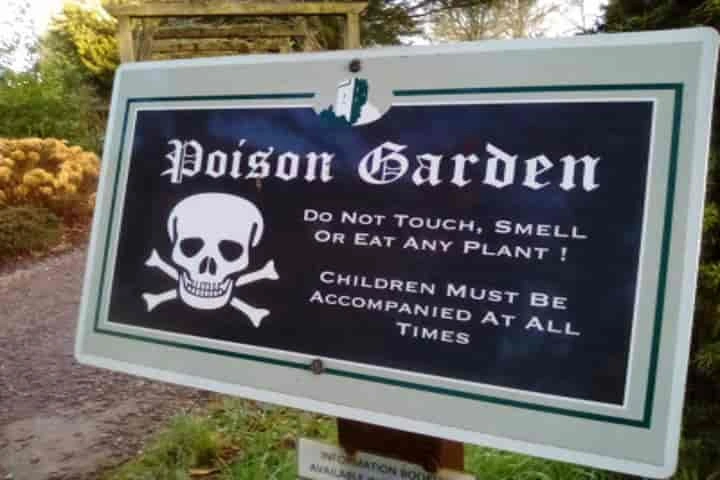

Instructions for visitors to the Poison Garden (Pics. Courtesy Twitter/@SusmitaUkil)
<p>
<strong>It is a garden where visitors are forbidden to touch, smell or taste any of the plants because located in England&rsquo;s Northumberland this garden is the world&rsquo;s deadliest. Forming a small part of The Alnwick Garden, this Poison Garden as it is commonly known as houses more than 100 varieties of toxic and narcotic plants.</strong></p>
<p>
The place came up according to a BBC report in 2005 after it was conceptualised by the Duchess of Northumberland, Jane Percy. For creating it, she reportedly hired a notable landscape architect of the French Tuileries, Jacques Wirtz.</p>
<p>
<iframe allow="accelerometer; autoplay; clipboard-write; encrypted-media; gyroscope; picture-in-picture" allowfullscreen="" frameborder="0" height="315" src="https://www.youtube.com/embed/52Ou1OiYCK0" title="YouTube video player" width="560"></iframe></p>
<p>
The Duchess was inspired to create this deadly place following her visits to the Medici poison garden in Italy.</p>
<p>
According to the official website of Poison Garden, 600,000 visitors come to see this place and people are allowed to enter and go around through guided tours. Before embarking on the tour, the visitors are told not to &ldquo;touch, smell or taste any plant&rdquo;. Yet, at times there are exceptions who take the warning lightly and faint on inhaling the toxic fumes of a plant.</p>
<blockquote class="twitter-tweet">
<p dir="ltr" lang="en">
The sun almost makes The Poison Garden a little less scary &#9760;&#65039;<br />
<br />
Walk beyond the gates for your guided tour to learn not everything is as it seems in a quaint English Garden. Tours are included with Garden Entry, just ask our friendly guides! &#127793; <a href="https://t.co/bD5fOKJVxH">pic.twitter.com/bD5fOKJVxH</a></p>
&mdash; The Alnwick Garden (@AlnwickGarden) <a href="https://twitter.com/AlnwickGarden/status/1540615572756598785?ref_src=twsrc%5Etfw">June 25, 2022</a></blockquote>
<script async src="https://platform.twitter.com/widgets.js" charset="utf-8"></script><p>
Besides the curious visitors, the place is frequented by botany enthusiasts who come from around the world to see some of the most lethal plants. These include Wolf&rsquo;s Bane, Monkshood and Rhododendrons among others.</p>
<p>
It is reported that the garden also has Ricin that is also known as Castor Bean or Castor Oil plant &ndash; termed as the most poisonous in the world by the Guinness Book of World Records as the most poisonous plant in the world.</p>
<p>
Many of these plants have medicinal value too. For example, the yew tree which has taxine poison and is known to kill within 20 minutes, also produces taxol which is used to cure breast cancer.</p>
Prime Minister Narendra Modi interacted with members of the Indian diaspora here on Wednesday as…
The city of Hamburg in Germany is set to host the 11th edition of India…
The International Atomic Energy Agency (IAEA) has confirmed that two Iranian centrifuge production facilities, TESA…
The human rights department of the Baloch National Movement (BNM), Paank, has strongly condemned the…
In a major boost to India's coastal defence capabilities, the Indian Navy on Wednesday commissioned…
Volker Turk, the UN High Commissioner for Human Rights, on June 17 expressed concern over…